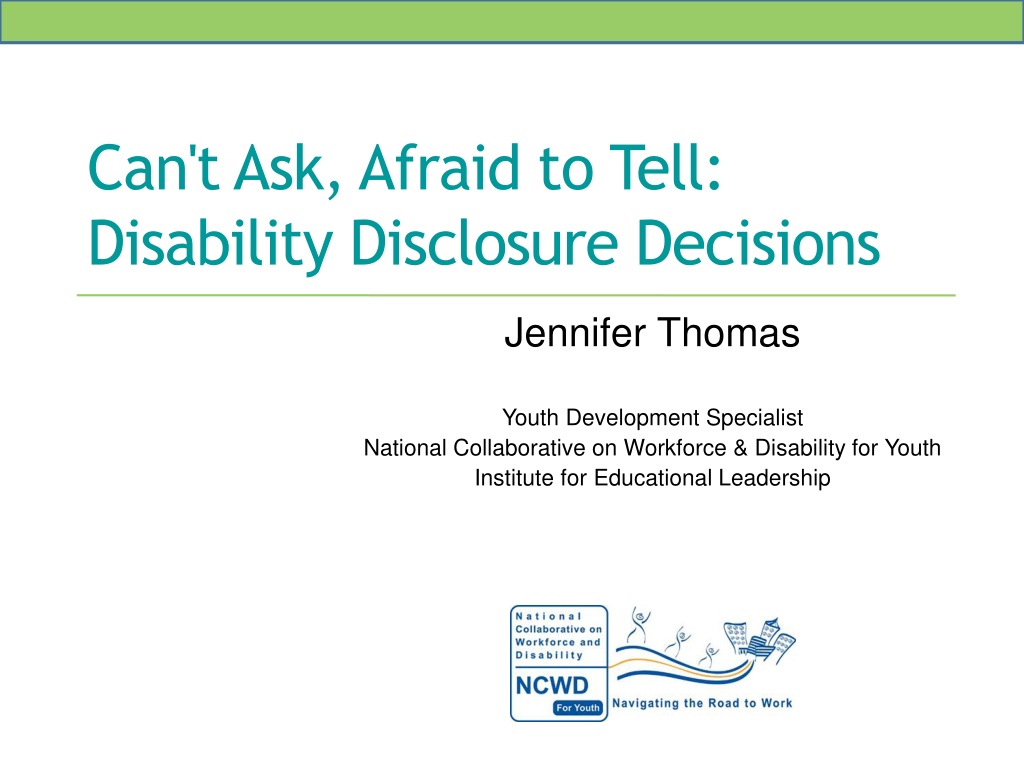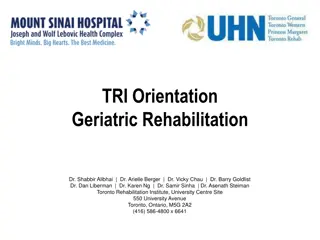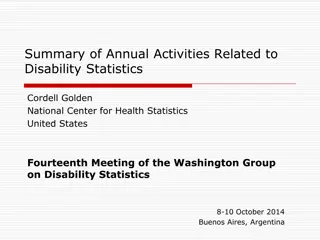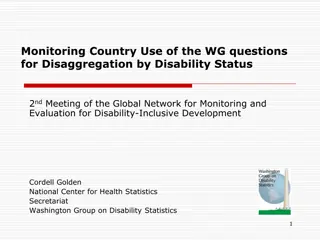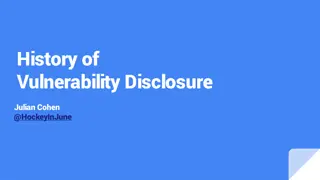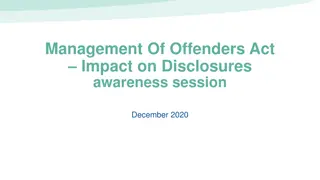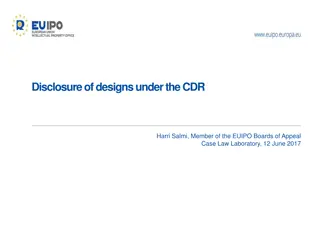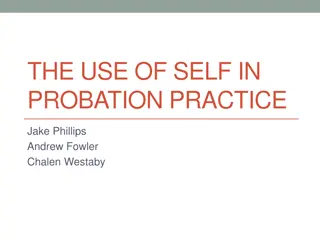Understanding Disability Disclosure Decisions for Youth
Explore the importance of disability disclosure for youth, covering definitions, advantages and disadvantages, decision-making factors, and the impact on education, employment, and social integration. Gain insights into rights, responsibilities, and the significance of accommodations beyond just services.
Download Presentation

Please find below an Image/Link to download the presentation.
The content on the website is provided AS IS for your information and personal use only. It may not be sold, licensed, or shared on other websites without obtaining consent from the author. Download presentation by click this link. If you encounter any issues during the download, it is possible that the publisher has removed the file from their server.
E N D
Presentation Transcript
Can't Ask, Afraid to Tell: Disability Disclosure Decisions Jennifer Thomas Youth Development Specialist National Collaborative on Workforce & Disability for Youth Institute for Educational Leadership
National Collaborative on Workforce and Disability for Youth (NCWD/Youth) Funded by the Department of Labor s Office of Disability Employment Policy National Technical Assistance Center Housed at the Institute for Educational Leadership Leads the National Youth Action Council on Transition (YouthACT)
During This Session, We Will: Define disclosure. Explain why disclosure is important for youth with disabilities. List advantages and disadvantages of disclosure. Compare and contrast disability disclosure in post- secondary education, in the work setting, and in social settings.
Disability Disclosure Poll Have you ever heard of disability disclosure? Yes or No
What is Disclosure? Intentionally releasing personal information about yourself for a specific purpose How your disability affects your capacity to learn and perform effectively The environment, supports, and services you ll need in order to access, participate, and excel at work, school, and socially Critical for both youth with visible AND invisible disabilities Most of all, a PERSONAL decision
Why is this important for Youth with Disabilities? Get a clear understanding of their rights and responsibilities if/when they disclose Helps YWD make informed decisions about disclosing disability that will effect educational, employment, and social lives To get the services they need!!! Advantages and disadvantages to making this decision
Disclosure Beyond Just Services Enables youth with disabilities to: Know their history Own their Culture Connect to their Community
Key Issues of Disclosure What to disclose Where to disclose When to disclose Who to disclose Rights/responsibilities of individual disclosing
Post-Secondary School Professors, Teacher Assistants, etc. Counselors/Advisors Disability Support Services
Why Disclose in Post-Secondary School? At the post-secondary level, accommodations are only provided when a student discloses and asks for them Requires open communication with professors, disability support services, and the student
Rights Be treated fairly and in a non-discriminatory fashion Discuss academic needs, supports, and accommodations in a non-judgmental setting Have information about your disability treated confidentially and respectfully Know what happens to personal information you choose to share with counselors, faculty, or staff Obtain information about DSS as well as physical/programmatic accessibility at the institution of your choosing
Responsibilities Investigate and fully understand the academic and practical requirements of your chosen course of study, including determining that this option matches your skills and abilities Recognize that disclosing on an application form or prior to enrollment does not eliminate your responsibility to contact DSS for accommodations Find out about options for accessing institution of your choice Advise faculty and staff of your disability related needs Understand that DSS may not be able to address needs if not disclosed in a timely manner Be self-determined and practical
Work Career Counselors Disability-specific adult employment services personnel One-Stop Career Center personnel Prospective employers or human resources personnel Workplace mentors
Why Disclose at Work? Employers and co-workers not required to provide accommodations unless the YWD discloses Obtain information to assist you in developing a career plan that addresses possible barriers and accommodations Identify disability-specific employment services & support networks Discuss employment requirements with recruiters or other professionals Discuss disability issues with prospective employers to determine whether requirements of the position can be met, with/without reasonable accommodations Investigate available workplace supports Develop mentoring and peer support structures with employers and employees with and without disabilities
Rights Have information about your disability treated confidentially and respectfully Seek information about hiring practices from any organization Choose to disclose at any time during the employment process Review appropriate accommodations in an interview so you may demonstrate your skills and abilities Be considered for a position based on your skills and merit Have respectful questioning about your disability for the purpose of reasonable accommodation Be self-determined and proactive
Responsibilities Disclose your need for accommodation if you desire any work- related adjustments Search for jobs that address your skills and abilities Inform the manager or interview panel about your need for appropriate interview accommodations in a timely manner Identify appropriate and reasonable accommodations for an interview Negotiate reasonable accommodations with an employer at the point of job offer and beyond Bring skills and merits to the table
Disability Inquiries The question of whether it is legal to ask disability-related questions turns on whether an agency is providing general services, providing employment-related training, or acting as an employment agency. Most important differences are: what disability-related questions the agency can ask a customer what the agency does with the information they obtain in response to these inquiries. For more info, see Disability Inquiries In The Workforce Development System www.ncwd-youth.info/information-brief-09
Disability Inquiries In the pre-offer stage a potential employer may ask the jobseeker: if she/he can satisfy the physical requirements of a job. to describe or demonstrate how she/he would perform job tasks (if asked of all applicants). if accommodations are needed for the application process. for reasonable documentation of a disability before providing accommodations.
Disability Inquiries In the post-offer, pre-hire stage a potential employer may ask the jobseeker disability-related questions and require medical exams (even if unrelated to job) if: All entering employees in the same job category are subjected to the same questions/exams, regardless of disability AND All information obtained through these questions/exams is kept confidential
Role Play Activity Divide into groups. Plan with your group ways in which you can act out the role play scenario provided to you. When it is your turn, act out your role play scenario with your group.
Cyber Disclosure Many employers and recruitment agencies use internet search engines and read social-networking-sites, websites, and blogs to learn more about job applicants. This is why it is important to be aware of the information about you that is available to the public on the internet.
Cyber Disclosure Advantages and Disadvantages Disclosure by Others Accidental Self-Disclosure Controlling Your Digital Presence
Social Settings Friends Relatives Owners or staff members of various businesses Public transportation staff Parks and recreation staff Events coordinators Mentors/Role Models
Why Disclose in Social Settings? Start relationships/friendships with honesty Discuss specific needs in order to identify accommodations in the community Receive any necessary assistance that may be needed while participating in community or social activities.
Rights Be treated fairly and in an non-discriminatory fashion Have info about your disability treated confidentially and respectfully Work collaboratively with others to identify necessary supports for your success Obtaining about disability support services as well as physical/programmatic access in community settings Be self-determined and proactive
Responsibilities Investigate and fully understand your disability and disability-related needs as they pertain to community living Find out about options for accessing the community settings of your choice Advise community members and friends of your accommodation and support needs Understand that community members and friends may not be able to address your needs if not presented in a timely manner
NCWD/Youth Disclosure Resources The 411 on Disability Disclosure: A Workbook for Youth with Disabilities www.ncwd-youth.info/411-on-disability-disclosure The 411 on Disability Disclosure: A Workbook for Families, Educators, Youth Service Professionals, and Adult Allies Who Care About Youth with Disabilities www.ncwd-youth.info/411-on-disability-disclosure-for- adults Cyber Disclosure for Youth with Disabilities http://www.ncwd-youth.info/cyber-disclosure Disability Inquiries In The Workforce Development System www.ncwd-youth.info/information-brief-09
NCWD/Youth Disclosure Resources National Collaborative on Workforce and Disability for Youth www.ncwd-youth.info DOL s Office of Disability Employment Policy www.dol.gov/odep Job Accommodation Network www.askjan.org Disability.gov (search disclosure )
Contact Information Jennifer Thomas Youth Development Specialist NCWD/Youth Institute for Educational Leadership thomasj@iel.org Ph. 202.822.8405 x162 www.ncwd-youth.info
